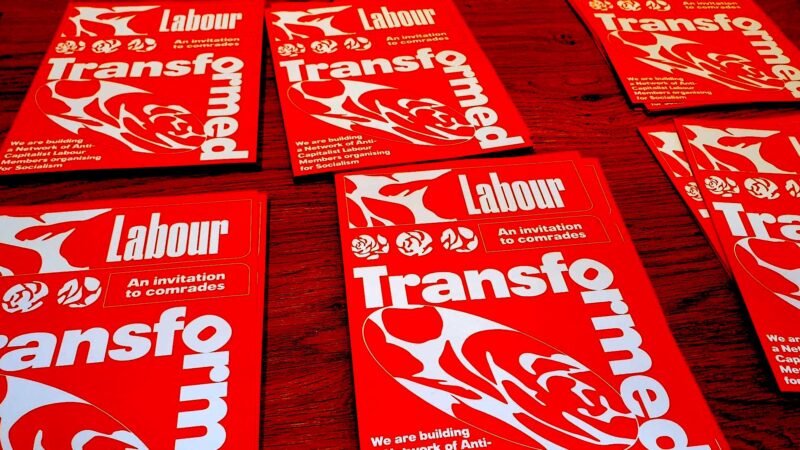
One would not normally expect that just two days after a historic defeat, over 100 people would turn up to discuss what should be next for the Labour left in a comradely and positive way. But this is exactly what happened on Saturday, at the first meeting of ‘Labour Transformed’, a new grouping initiated by activists inspired by The World Transformed and our radical policy platform.
Labour Transformed called the meeting on the basis of a set of founding principles it developed before we knew the scale of defeat the Labour Party would suffer, which put Jeremy Corbyn’s leadership to an end. But despite this, it already diagnosed some of the core issues those of us who will analyse what went wrong and what must come next will have to get to grips with.
Among them is the “support for meaningful direct action”. This is defined as extra-parliamentary campaigns that empower and further the political aims of the working class. Johnson’s majority means that the onslaught on oppressed communities under this government cannot be resisted through the House of Commons. There simply will not be the votes to block or bring forward different legislation. A hung parliament would have offered that chance – but this hope is now gone. Writing to your MPs will not have a material impact on people’s lives over the next five years. Instead, we have to build community power. This means that Labour members who want to resist the government have to turn outwards again.
Sadly, since Corbyn was first elected and Momentum was formed, the Labour Party has failed to develop a ‘one leg in, one leg out’ approach to left-wing politics that could marry a gradualist electoralist party with movement-focused politics. Plenty of activists with a background in movement politics got involved with the party, which was positive. But rather than this turning the party into a social movement, we turned these activists into regular Labour campaigners who spent most of their time knocking on doors and delivering leaflets. Although one cannot deny the incredible effort that Momentum campaigners put into mobilising activists for the election, at the end of the day the ‘ground war’ alone is not enough.
As a potential solution, community organising models have been a big part of the discussion at Labour Transformed and elsewhere. This could see Labour members more involved in existing community projects helping to sooth the immediate issues many working class and marginalised communities face. Activists can then help build organic leaders and develop them into advocates (or candidates) for a Labour government in the long term. Whilst an amicable goal, a clear political focus should not be watered down by charity-like campaigns. Middle-class people happily donate to good causes. Tory politicians take photo opportunities in food banks, praising the work the volunteers do whilst being responsible for the poverty that forces people to use them in the first place.
Class power can only be developed if community organising is linked with solid political education. Crafting a counter-narrative means implementing our theoretical framework in praxis in our communities, through this building support for our programme for government.
Labour Transformed proposed working groups on political education and media and counter-propaganda to help do this. Our political education should be rooted in a development of class consciousness and intersectional solidarity. By this, I mean a political analysis that does not pit the goals of the working class against the liberation of women, ethnic minority and migrant communities and LGBT+ comrades, but understands that none of these can happen without the other. Class-consciousness means an understanding of how power dynamics in society affect our own lives and the lives of others. It teaches us that our own oppression is the result of these power dynamics under capitalism: that our bosses are guided by the principle of profit maximisation at our expense. We can only overcome this if we organise collectively.
The election laid bare the huge extent to which the intellectual legacy of Thatcherism is still embedded in the very fabric of this country. One only had to listen to discussions on taxation and the welfare state to understand that the pursuit of material benefits for the individual, rather than collectivism, is still considered to be the solution to inequality. Thatcherism was successful in dismantling the post-war social democratic consensus because it built a theoretical framework that was reflected in policies that gave the impression to working class people that their material interests were separate from the Labour movement.
The right to buy comes to mind as the masterstroke of this strategy: by giving working class people the opportunity to move into the property-owning class it hindered potential resistance against the Conservative’s plans to dismantle council housing, pushing generations of people who came afterwards into a precarious and expensive private housing market.
Under these conditions, it was incredibly hard for Labour to win with a manifesto that for the first time actively challenged the British political and economic settlement. We simply had not done the necessary work to change perceptions and a very limited ability to give our cause a fair hearing in the media. Undoubtably this will have played a role in our defeat. Attending Labour Transformed was a glimmer of hope – if we can harness some of the energy that remains within the Corbyn project and get serious about this work, then perhaps all is not lost for the future.




More from LabourList
‘Tackling poverty should be the legacy of Keir Starmer’s government’
‘The High Court judgment brings more uncertainty for the trans community’
‘There are good and bad businesses. Labour needs to be able to explain the difference’